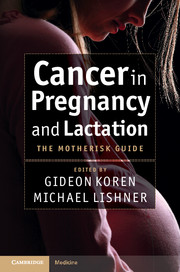Book contents
- Cancer in Pregnancy and Lactation: The Motherisk Guide
- Cancer in Pregnancy and Lactation: The Motherisk Guide
- Copyright page
- Contents
- Preface
- Acknowledgement
- Contributors
- Section 1 Specific tumors during pregnancy
- Section 2 Fetal effects of cancer treatments and interventions
- Section 3 Management of maternal complications during treatment
- Section 4 Long-term effects ofin uteroexposure on children
- Chapter 20 Long-term neurodevelopment of children exposedin uteroto treatment for maternal cancer
- Chapter 21 Fertility of children exposedin uteroto chemotherapy
- Chapter 22 Lactation and cancer chemotherapy
- Chapter 23 Breast cancer and pregnancy: critical review of the effects of prior and subsequent pregnancy on the prognosis of young women with breast tumor
- Chapter 24 Effects of the placenta on metastatic breast cancer
- Index
Chapter 20 - Long-term neurodevelopment of children exposedin uteroto treatment for maternal cancer
from Section 4 - Long-term effects ofin uteroexposure on children
Published online by Cambridge University Press: 05 December 2011
- Cancer in Pregnancy and Lactation: The Motherisk Guide
- Cancer in Pregnancy and Lactation: The Motherisk Guide
- Copyright page
- Contents
- Preface
- Acknowledgement
- Contributors
- Section 1 Specific tumors during pregnancy
- Section 2 Fetal effects of cancer treatments and interventions
- Section 3 Management of maternal complications during treatment
- Section 4 Long-term effects ofin uteroexposure on children
- Chapter 20 Long-term neurodevelopment of children exposedin uteroto treatment for maternal cancer
- Chapter 21 Fertility of children exposedin uteroto chemotherapy
- Chapter 22 Lactation and cancer chemotherapy
- Chapter 23 Breast cancer and pregnancy: critical review of the effects of prior and subsequent pregnancy on the prognosis of young women with breast tumor
- Chapter 24 Effects of the placenta on metastatic breast cancer
- Index
Summary
- Type
- Chapter
- Information
- Cancer in Pregnancy and LactationThe Motherisk Guide, pp. 157 - 175Publisher: Cambridge University PressPrint publication year: 2011

